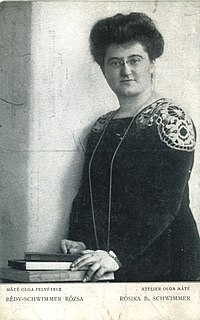A Quote by Uzodinma Iweala
We are not living in the same world we were immediately after the Cold War, when there seemed to be a greater belief in the universality of human rights and there was enough prosperity to make us question why we had not committed more resources to upholding the values we claimed to hold most dear.
Related Quotes
At the beginning of World War II the U.S. had a mere 600 or so first-class fighting aircraft. We rapidly overcame this short supply by turning out more than 90,000 planes a year. The question at the start of World War II was: Do we have enough funds to produce the required implements of war? The answer was No, we did not have enough money, nor did we have enough gold; but we did have more than enough resources. It was the available resources that enabled the US to achieve the high production and efficiency required to win the war. Unfortunately this is only considered in times of war.
To overcome extremism, we must also be vigilant in upholding the values our troops defend ? because there is no force in the world more powerful than the example of America. That is why I have ordered the closing of the detention center at Guantanamo Bay, and will seek swift and certain justice for captured terrorists ? because living our values doesn't make us weaker, it makes us safer and it makes us stronger.
For 40 years we were led to think of the Russians as godless, materialistic and an evil empire. When the Cold War ended, we suddenly discovered that Russia was a poor Third World country. They had not been equipped to take over the world. In fact, they were just trying to improve a miserable standard of oppressive living, and couldn't. They had to spend too much on arms build-up. We didn't win the Cold War; we bankrupted the Russians. In effect, it was a big bank exhausting the reserves of a smaller one.
Because the US has control of the sea. Because the US has built up its wealth. Because the US is the only country in the world really not to have a war fought on its territory since the time of the Civil War ... Therefore we can afford mistakes that would kill other countries. And therefore we can take risks that they can't ... the core answer to why the United States is like this is we didn't fight World War I and World War II and the Cold War here.
....I understood why those who had lived through war or economic disasters, and who had built for themselves a good life and a high standard of living, were rightly proud to be able to provide for their children those things which they themselves had not had. And why their children, inevitably, took those things for granted. It meant that new values and new expectations had crept into our societies along with new standards of living. Hence the materialistic and often greedy and selfish lifestyle of so many young people in the Western world, especially in the United States.
A lot of the people in history who I really admire lived before the hyperinformation age we're living in. Even if they were governing or solving problems in consequential periods, like the Civil War or the world wars or the Great Depression or the Cold War, they had a period of time and space to actually think, to be private and you read their biographies, and they had time to think about what was happening and how to respond. I don't think human nature has changed in the last 50-150 years, but the stresses, the demands on those of us in public life have just exploded.
When you say that after World War I there was a pandemic that killed more people than the war itself, most will say: "Wait, are you kidding? I know World War I, but there was no World War 1.5, was there?" But people were traveling around after the war, and that meant the force of infection was much higher. And the problem is that the rate of travel back then was dramatically less than what we have nowadays.
The sky was different, without color, taut and unforgiving. But the water was the most unforgiving thing, nearly black at times, cold enough, I knew, to kill me, violent enough to break me apart. The waves were immense, battering rocky beaches without sand. The farther I went, the more desolate it became, more than any place I'd been, but for this very reason the landscape drew me, claimed me as nothing had in a long time.



































